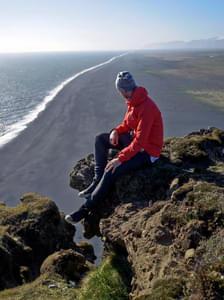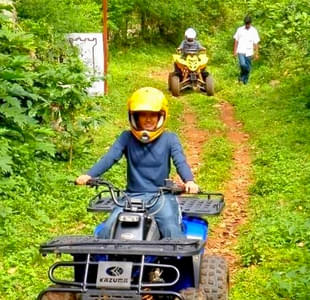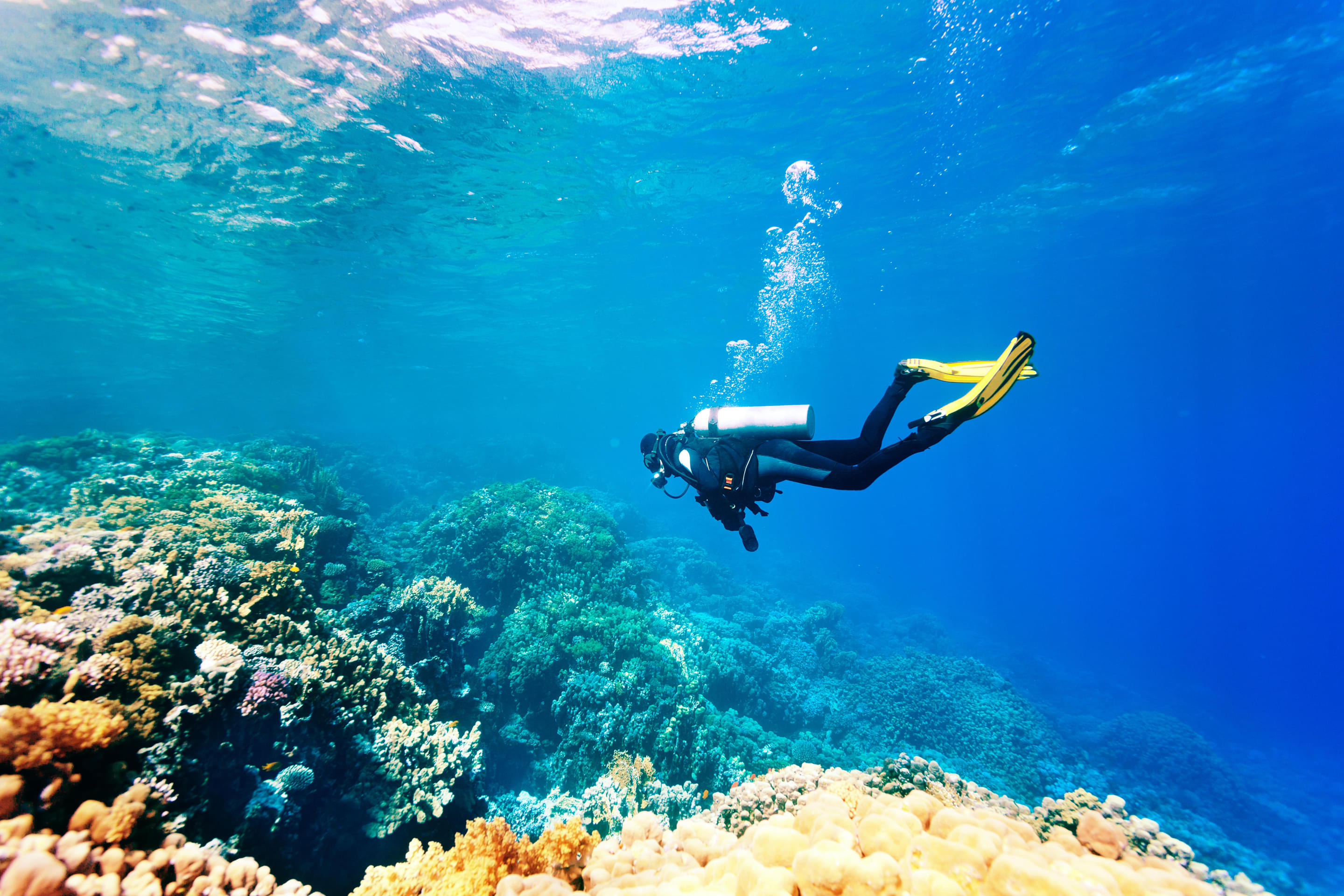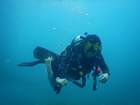Scuba Diving in Goa
Goa Scuba Diving Packages | Duration | Price |
|---|---|---|
| Grand Island Scuba Diving with Free Videography | 7 hours | USD 30.52 |
| Grand Island Goa Scuba Diving with Water Sports Activities | 10 hours | USD 17.02 |
| Premium Scuba Diving Package, Goa | Use THRILLO200 for Flat 200 Off | 6 hours | USD 29.36 |
| Scuba Diving In Malvan | 9 hours | USD 17.6 |
Goa is the ultimate destination for thrill seekers to fulfill their fantasy of playing with the splashing waters and explore the depths of ocean. Bordered by the Arabian Sea, Goa is blessed with an exotic marine life which has made it a popular diving destination in India. When in Goa, you should definitely indulge in scuba diving to come face to face with underwater life. While daring divers can go for exploring the waters at most hotels and beaches in Goa, beginners also can take scuba diving lessons and training at scuba diving schools in Goa for partaking in this thrilling sport. Amongst all the water sports, the best scuba diving tours in Goa are one of the most sought after activities enticing the excitement and curiosity of most travelers.
Explore the wrecks of past wars off the coast in the waters that touch Goa. Not only the fascinating ship wrecks but also the diverse marine life which includes a different color pallet, turtles, reef sharks and aquatic plants add an interesting twist to the diving experience in Goa. Some of major diving sites in Goa are Grande Island, Pigeon Island and Agatti Island. There are also some shallow sites between Venugurla and Malvan which is about 2 hours away from the capital city of Panaji which provide scuba diving. The enthralling experience of scuba diving can be enjoyed with the help of professionals and trained scuba divers in Goa who guide you every step of the way. All you need to do is to just shed your inhibitions, familiarize yourself with the equipment and take a cool plunge for exploring the breathtaking landscape under the waters of Arabian Sea. So just imagine the adrenaline rush you feel as you dive into the water with a plethora of aquatic flora and fauna in front of you in the clear azure waters of Goa. If you really want to take a closer look at what reflects the true beauty of nature, the best scuba diving tours in Goa are highly recommended for everyone.
Goa Scuba Diving Packages
Best Scuba Diving Destinations
Our Partners
Newly Added Experiences
Tourism Board Alliances
Goa Scuba Diving FAQs
Where can I go for Scuba diving in Goa? Which is the best place to do scuba diving in Goa?
There are a lot of places where you can enjoy the ride to witness the underwater world. Here is a list of all major scuba diving spots in Goa:
- Cove of Shelter- Depth 8 metres
- Reef of Uma Guma - Depth 14 metres
- Bay of Bounty - Depth 6 metres
- Wreck of Suzy’s - Depth 30 metres
- The Jetty - Depth 6 to 8 metres
- Locker of Davy Jones - Depth 14 metres
- The Turbo Tunnel - Depth 8 to 10 metres
- Sail Rock - Depth 8 to 24 metres
- Grande Banks - Depth 4 to 8 metres
Which is the best time for scuba diving in Goa?
The scuba diving season in Goa starts from mid-October and goes on until the mid of April. As the water temperature in Goa remains around 27-30° C throughout these few months, diving for beginners as well as experts becomes very comfortable.
Exactly why Goa is considered to be one of the best places in India.
Can kids do scuba diving in Goa?
The minimum age required to participate in scuba diving is 10 years. Scuba diving requires an individual to follow a certain set of instructions and understand them thoroughly. Kids of age 10 and below may fail to implement these guidelines.
However, there is no maximum age limit. So the entire family can engage in this activity while children younger than the age of 10 years can participate in other activities like snorkeling and PADI bubblemakers.
What is the minimum and maximum age for scuba diving in Goa?
The minimum age required to dive in the sea is 10 years while there is no maximum age limit to experience the underwater world and thrill.
What is the duration of scuba diving in Goa?
Your scuba diving can be of different durations at different places. Normally, it is a 15 minute to 20 minute dive wherein you are easily able to take a glimpse into the underwater world coral reef and fishes.
What is the average cost of scuba diving in Goa?
The average cost of scuba diving in Goa is INR 2000 ($3) per head for a total diving time of 15 minutes. You may observe a change in the price depending upon the location.
Usually, these are fixed rates but you can try your luck and bargain in case many of you are up for their service.
Can a non-swimmer go for scuba diving in Goa?
Yes, a non-swimmer can go for a scuba diving experience with no worries. They can master the art as efficiently as a swimmer. You do not need to be a swimmer to have any experience in the ocean to try Scuba Diving.
If you’re a non-swimmer it is normal for you to be very nervous on your first diving experience, but don’t worry, you’re not going to drown. Just focus on the instructions given by your instructor and you’re good to go!
What precautions should be taken before going for scuba diving in Goa?
Below are a few rules that you can practise for a safe scuba diving experience.
- Never hold your breath, ever!
- Practice safe descents
- Check your gear beforehand
- Dive only within your limits
- Stay physically fit
- Never dive alone!
What is special about scuba diving?
Goa has many spots where you can indulge in scuba diving activity. It is a go-to destination where experts experiment and beginners learn. The various spots here have different water depths that welcome a beginner as well as a professional.
So every enthusiast can choose a spot according to their convenience and experience. Moreover, the water temperature in Goa remains around 27-30° C throughout the months of October to mid April which is considered to be the best time for scuba diving in Goa. Hence, as the climate and weather conditions are totally suitable, this activity in Goa is special and fun filled.
Is diving safe for an asthma patient?
Just like it is with all divers, the individual health of the person must be taken into account before determining whether scuba diving is a safe option for that individual or not.
An asthma patient may be at a higher risk of injuries but that can also be the case with any other individual who has a relatively poor physical shape. In case your health is good overall and stress is not a major trigger for you, diving can be an activity that you can enjoy without any fear.
What are the most common injuries or sicknesses associated with scuba diving?
Here’s a list of injuries or sickness that you may incur after a scuba diving experience. These temporary sickness feelings are very normal and will gradually stop.
However, if you face trouble for long, it is best advisable to consult a doctor.
- High pressure
- Impaired thinking or drowsiness
- Unconsciousness
- Panic
- Loss of balance and disorientation
- Bites and stings from various marine life
- Sunburn and heat disorders
- Cuts and bruises
- Motion sickness
- Pain in the ears
My ears hurt when I dive to the bottom of a pool. Won’t they hurt when I dive in the sea?
The pain in the ears is a normal sickness associated with diving. This happens because in normal situations, the air inside your ear is at the same pressure as the air outside your ear. But when you dive, the water outside causes excess pressure inside your ears that causes the eardrum to expand like a spring.
This is exactly why your ears hurt! So when your ears hurt after diving in a pool or the sea, don’t panic. It gets back to normal after the pressure inside and outside the ears is equal.
What does the scuba divers Never-to-do checklist look like?
While we all understand certain rules of scuba diving, it is also important to know what shouldn't be done during and after a scuba diving experience.
Here is a list of no-to do- things you can make a note of:
Scuba Diving Don’ts
- Never drink and dive
- Never eat a big meal before diving
- Never dive immediately after eating. Wait for at least two hours after eating before you start scuba diving
- Never dive outside of your comfort level or your limits
- Never dive with broken equipment and gear
- Never dive alone
- Never hold your breath
What are the diving courses available in Goa?
There are a number of scuba diving institutes that train you in scuba diving and offer a wide variety of SSI and PADI certification courses. Right from beginners level to expert level, these institutes have courses for everyone.
Here few types of courses:
- PADI Open Water Diving Course - 4 days
- PADI Advanced Diver - 2 days
- PADI Rescue Diver - 4 days
- PADI Divemaster - 7 days
Are there any certifications available for scuba diving in Goa?
Yes, there are several certifications available for scuba diving enthusiasts. Anybody and everybody who wishes to be a certified diver can apply, get trained and achieve this certificate.
PADI is one renowned certification that allows you to dive as a certified diver throughout India. It offers many certifications in Goa.
What is the difference between snorkeling and scuba diving?
Snorkeling is a swimming activity with a snorkel. Here, a mask and a tube is required that helps you to breath through your mouth when floating underwater yet near the surface of the water. In this activity, the swimmer’s entire body is under water.
The diver's nose and eyes are covered by a diving mask and the diver cannot breathe in through the nose, except when wearing a full face diving mask. The diver adapts to inhaling from a regulator's mouthpiece.
Scuba diving activity lets you go deep inside the water to examine the bed of the sea or a lake. Here, you have to wear a tight fitted diving suit and breathe through an oxygen tank. Head & nose of the diver are underwater.
Which are the reputable scuba diving center in Goa?
Following are a few reputable scuba diving centres in Goa. They train and provide you with a scuba diving certificate that make you a certified diver.
- Dive Goa
- Atlantis Watersports
- Goa Aquatics
- Barracuda Diving
What is the minimum duration required to learn scuba diving in Goa?
There is no fixed duration required to learn scuba diving in Goa. The duration depends on how well your body adapts to the underwater situations and implements the learned technique. There are institutes that provide 2 days as well as 2 month courses.
It depends on whether you’re learning this activity just for a hobby or to pursue this field as a professional. In the second case, you have to go through different levels of training to eventually be called an expert diver.
Goa Scuba Diving Reviews











.jpeg?w=340&dpr=2)


.png?w=340&dpr=2)















.jpg.jpg?w=1280&dpr=1)









